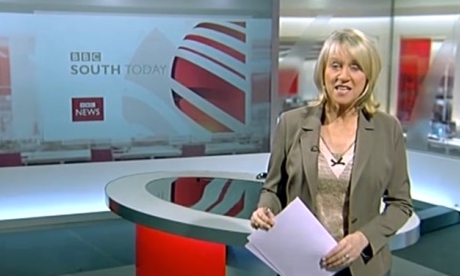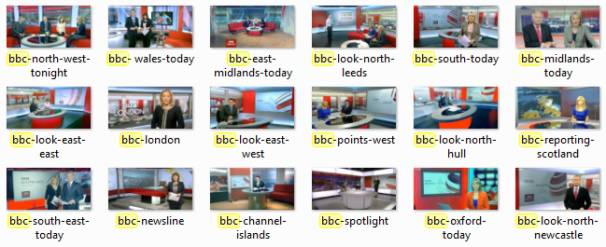Why the BBC should abandon 700+m "regional news" to fund local radio, BBC three,

Is Sally Taylor (and her colleagues) really worth over seven hundred million pounds a year? Photograph: BBC
Why am I making these proposals in the first place?
Following the recent announcement to "take BBC three online", I thought I would take a look at the BBC programme budget and see if there was an alternative.It seems to me that to reduce the BBC budget by 0.5% by taking a service which is valued by a normally hard-to-reach demographic was unfair.
And I think there is a gaping hole in the budget of BBC One that needs urgent attention.
With the renewal of the BBC Charter coming up soon, now might be the time to act.
What am I proposing?
I am saying that the BBC needs to abandon BBC local news in England and Wales because it costs a fortune to provide, is poor value for money and it is not very good.I am saying that the hundreds of millions of pounds spend should be used to provide:
- Funding a new family-comedy slot at 6:30pm on BBC One;
- Funds to keep broadcasting BBC three as a TV channel for the next decade;
- Funds to make BBC FOUR a better service;
- Money for local radio to improve the local radio news websites (and Red Button) and provide a full local news service in the 6:30pm-7pm slot.
- Provide a Scottish Six news programme at 6pm on BBC One Scotland, and a similar service for Northern Ireland.
- Save £615 million pounds;
BBC - Press Office - BBC Nations & Regions
"BBC Nations & Regions is the largest regional broadcasting operation in the UK- accounting for more than £550m of BBC expenditure and employing nearly 7,000 staff across the UK."

At 2014 prices, half-and-hour evening slot costs £715,000,000 a year.
The problem with regional news
The first problem with regional news is that it is very expensive - costing £715m a year. That's more than enough to fund BBC local radio FIVE times or BBC TWO, BBC three AND BBC FOUR.The second problem is that it is poorly targeted. Even back in the 1960s the BBC observed:
"The boundaries were drawn some forty years ago not on any basis of community interest but to match the range of the transmitters. These are regions devised by engineers rather than sociologists. We respect the loyalties which the present English Regions have created but we now propose to replace them with eight smaller and more socially logical regions. " - Broadcasting in the Seventies
The current regions are too large to be socially logical and provide local news to anyone. Real people are interested in what happens in their street, their town. If they live in a city, they care what is happening in their part of the city.
No one really care what's happening in their "region". To spend over £700m a year on a service to these areas is wrong.
The reason for them is they are a legacy of the start of the ITV network in the 1950s and 1960s. The BBC had to match a network of ITV companies that most people have long since forgotten about.
The Scottish issue
The government and legal system in Scotland (assuming that it stays within the Union) is different to that in England and Wales. Because of this a special 6pm programme for BBC One Scotland should be provided. This should use the main BBC news packages for international and UK-wide news, but also provide suitable Scottish Parliamentary and domestic priority stories.The Northern Ireland Issue
Exactly the same arguments can be made for Northern Ireland: therefore a 6pm news programme "edited and re-purposed" for the province is also essential.What to do with the £715m saved?
Firstly there needs to be some funds allocated to Scotland and Northern Ireland for their special 6pm and 10pm news.Then £20m should go to enable BBC local radio in England to provide a comprehensive news programme at 6:30pm and 10:25pm and training, staff and support to ensure that the BBC local radio news websites are fit for purpose.
£30m should go to BBC three to enable it to be kept as a television service. It is important to not disenfranchise those young adults who can't or won't go online.
£50m should go to BBC FOUR. It is an excellent channel that suffers from having too small a budget to provide what it does in enough quality. This money should be able to provide a weekly hour of new science, history, arts, international affairs and
And what of the empty slot between the BBC News and The One Show?
I propose that BBC One takes a leaf out of BBC Radio 4 and uses the slot as an comedy antidote to the news. Five slot might mean a panel show (say, QI), a stand-up show (like Russell Howard, but pre-watershed), something leftfield (like The Might Boosh) and there's still room for some satire.Tuesday, 11 March 2014
Ian
9:13 PM
Hinckley
9:13 PM
Hinckley
I have read it and dont agree with it.
| link to this comment |
Ian's: mapI's Freeview map terrainI's terrain plot wavesI's frequency data I's Freeview Detailed Coverage
Ian: On what grounds? I presume you have some alternative research you can point to? Is there a study that shows that increasing the number of ad slots to be watched will result in advertisers spending more?
I'm really interested to know of one.
It is interesting to note that no ad-funded broadcaster has EVER asked for the licence fee to be changed to advertising.
| link to this comment |
M
MarkAndrew9:19 PM
Interesting perspective. I live in North Gloucestershire, and listen to BBC Radio Gloucestershire at breakfast. Often, they have news stories involving the specialist BBC Points West reporters. Then I might watch Points West and see the same story on TV (plus pictures!).
The morning Points West bulletins often seem dominated by stories from Bristol & Bath, at the expense of Gloucestershire, Somerset and Wiltshire; and the same at the weekend (probably because Points West and BBC Radio Bristol are co-located?).
Personally, if there was a financial need, I might favour a good British compromise, which might be an elegant solution. I could tolerate no morning, lunchtime, or late evening regional TV bulletins....but I would want to retain the 6.30pm Points West bulletins, as there are shared interests in the region, and the ITV West offering is so dire.
If the issue was surely about making savings, I'd leave it there. If we are looking at the redistribution of resources, I would like to see some reallocated to bolster BBC local radio, and to widen the output of BBC Radio 4 Extra, which is excellent, but too repetitive in its schedules.
(Finally, I seem to remember seeing in tbe past some very low audience figures for BBC Radio 3. Why is Radio 3 never subject to the same scrutiny as other aspects of the BBC?)
| link to this comment |
R
Rob9:20 PM
Why have a 6pm news service for Scotland & Northern Ireland but not Wales?
Following the Silk Commission's recommendations its very likely that Wales will get the same level of autonomy that Scogtland & Northern Ireland currently have now.
| link to this comment |
Aerialman: "Professionally presented by good anchors and backed up by
more than able journalists."
Really? It looks like a throwback to the 1970s. Apart from a new set nothing much has changed.
"For example there is a more in depth look at local sport,weather and items that sometimes affect in-directly the viewer."
So. £715m a year for a service that has things that sometimes affect you: indirectly? Local sport: easily done on local radio. Local weather: there's an app for that.
"This particular regional magazine has won industry awards. "
Which really proves my point: the best of a bad bunch. These services are outdated, turgid, barely relevant to the viewer and cost and absolute fortune.
I think it's a no-brainer. Scrap 40 minutes from the whole schedule and you get to DOUBLE THE BUDGET for everything else AND still have money left.
How good would BBC One be then?
| link to this comment |
Rob: Perhaps you could do that. But until the Silk Commission's recommendations are acted upon, such a service isn't required!
| link to this comment |
MarkAndrew: Thanks.
I don't really think that you could consider cutting back the regional news service, you would need to stop all to make the actual savings.
Saying "keep the 630pm programme" means keeping more-or-less everything.
If you get rid of the whole caboodle, you don't need expensive BBC studios sitting around in Cambridge,
Channel Islands, Norwich, Nottingham, Leeds, London, Newcastle, Southampton, Oxford, Tunbridge Wells, Plymouth, Bristol, Cardiff, Nottingham and Hull.
That's how to cut a budget. Not "take BBC three online".
| link to this comment |
D
David Roberts9:36 PM
Rob: If i may be allowed to contribute to this issue,part of the answer may be that In Wales,many viewer's prefer to watch their tv from English tv regions. Here on the North facing North Wales coast,Winter Hill is by far the preferred DVB-T service provider and it always has been the case. The same applies to the Southern part of South Wales,where a large proportion of viewers,prefer the output of the Mendip Transmitter,to that of Wenvoe.
To introduce a 'Wales Six' may lose BBC Wales more viewer's.Also in a recent survey carried out by BBC Wales,it appears public opposition to the whole idea of a Welsh Assembly Government,has increased.
| link to this comment |
David Roberts: Please do join in.
If there was a Welsh Six, Anglophiles could always tune to the BBC News channel which would be carrying the English Six.
| link to this comment |
M
MikeB9:44 PM
Briantist: '"This particular regional magazine has won industry awards. " - I remember seeing this on the East Midlands BBC regional news credits. Its sounds impressive (RTS ward, no less http://www.rts.org.uk/awa…ds), until you realise that it was up against the BBC's West Midland REgional programme (of which it was once a part), and ITV News Central. So basically it came first out of three....
I think this thread is the perfect example of how much people like their 'local' news, no matter what.
| link to this comment |
Select more comments
Your comment please!